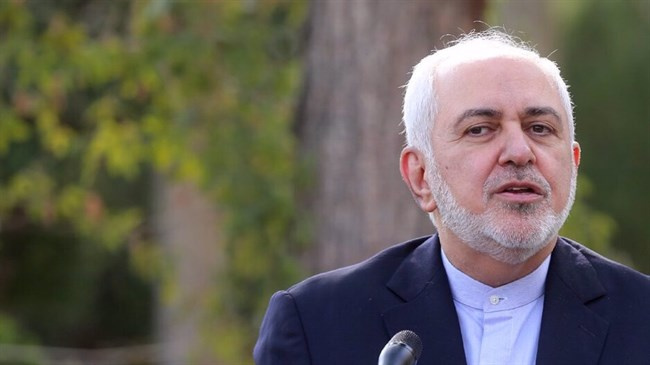Zarif: Time running out for US to make up for Trump-era mistakes, failed policies

Iran’s Foreign Minister Mohammad Javad Zarif has once again stressed that Washington is losing the chance to adopt a new approach toward Iran stressing “the existing window is rapidly closing.”
Zarif made the remarks on Wednesday in an address on the 42nd anniversary of the victory of the Islamic Revolution that ousted the US-backed Pahlavi regime, Press TV reported.
He said that time is running out for Washington to adopt a new approach towards Iran, stressing that it is up to the new US administration to learn a lesson from the failure of the so-called maximum pressure policy.
Over the past four decades, Zarif said, seven successive US administrations gambled that they would force Iran into submission but they all failed.
Referring to the former US president’s “maximum pressure” policy vis-à-vis Iran, he said “Donald Trump gambled on the fallacy that the Iranian nation could be forced to choose between collapse and surrender.”
“We all saw the result of that bet. But the reality is that Trump was neither the first nor the second, but the seventh successive president of the United States to have made such a bet and failed,” he added.
The top Iranian diplomat said that with the new US administration in power, there was an opportunity for Washington “to try a fresh approach, but the existing window is rapidly closing.”
He said that under a law approved by the Iranian parliament, the government is soon to adopt a new countermeasure to "expand its nuclear program and slash cooperation with the inspectors of the UN nuclear agency" in response to the “regrettable failure” of the US and the Europeans to honor their obligations under the 2015 Iran nuclear deal, officially dubbed the Joint Comprehensive Plan of Action (JCPOA).
This can only be avoided if the United States decides to learn from Trump's maximum failure, not incline towards it,” he noted.
Much to the dismay of the international community, Trump left the JCPOA in 2018 and unleashed the toughest ever sanctions against Iran in total disregard for international law. He also prodded other countries into cutting trade with Tehran or face Washington’s punitive measures.
Iran waited for an entire year for the remaining European parties to fulfill their end of the bargain. However, as they failed to safeguard Iran's interests, Tehran began in May 2019 to scale back its JCPOA commitments under Articles 26 and 36 of the accord covering Tehran’s legal rights.
Trump claimed time and again in vain that his administration’s maximum pressure policy would force Iran to surrender.
His successor, Joe Biden, who was vice president when the JCPOA was signed, criticized Trump’s withdrawal from the deal and said during his presidential campaign that he hoped to return his country to the deal. But since taking office in January, his administration has taken a harder line, demanding that Tehran first resume its "compliance."
Iran says the US needs to take the first step as it was the party that quit the deal, stressing that Washington should lift all the sanctions and not just verbally on paper before Tehran reverses its countermeasures.
Iran’s Ambassador to the United Nations Majid Takht-Ravanchi in an interview with the English-language France 24 television news network on Tuesday said, “It’s quite clear who should take the first step” since it was Washington that left the nuclear deal in 2018.
“Our people do not have any trust in the words of the United States. So, it is the United States that needs to start implementing its obligations in order to gain the trust of the Iranian people. The United States is obligated to honor its commitments,” he said.
Moreover, Deputy Foreign Minister Abbas Araqchi stressed in a recent interview with China’s Global television Network (CGTN) that there was not much time left for the US to revive the agreement.
He said that under the recently-passed law by the Iranian parliament, the government was required to start enriching uranium up to 20 percent right away, which it did almost a month ago, adding that the parliament has also decided that the voluntary implementation of the Additional Protocols could be stopped two months after the law came into force.
He said that if the sanctions are not removed by the set deadline, which is February 21, then the government will stop implementing the Additional Protocols.
He said the suspension of the Additional Protocols would mean that the number of inspections and inspectors in Iran would be reduced.
“Now, it is up to President Biden to correct that policy. If they want to maintain JCPOA in place as a very important achievement of diplomacy and a very important instrument in non-proliferation regime, they should decide very quickly because time is running out for the reasons that I already mentioned,” he said.
He, however, said that Iran will be ready to reverse its measures once it can verify the sanctions are removed.
Leader of the Islamic Revolution Ayatollah Seyyed Ali Khamenei said on Sunday that Iran will retrace its nuclear countermeasures once the United States lifts its sanctions in a manner that could be verifiable by Tehran.
Source: Iran Daily

